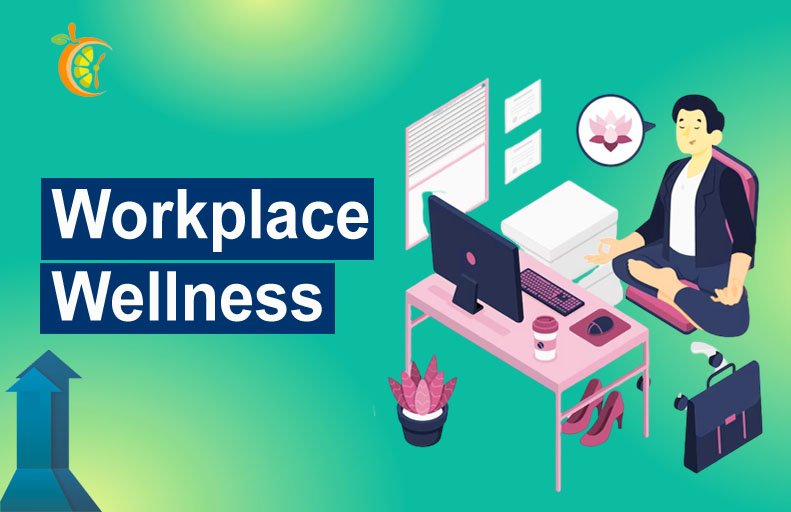Many of us spend a half-time portion of our day time at work and live sedentary lives that can significantly affect our health. We just focus on productivity and meeting deadlines, but it’s also important not to neglect our well-being and take it for granted. Workplace wellness is an essential aspect of our lives, and taking steps to maintain good health at work can positively impact our overall quality of life. Whether you work in an office, from home, or in any other setting, these tips can be custom-made to fit your specific circumstances. In this post, we have discussed some tips to maintain your health.
Tips for Good Health at the Workplace
In the under section, we have mentioned the ten useful tips for good health at the workplace:
Prioritize Ergonomics
Proper ergonomics can dramatically impact your physical health at work. Make sure your workspace is organized to encourage healthy posture and lower the probability of musculoskeletal problems. If you can, spend money on an adjustable workstation and an ergonomic chair. Adjust your computer monitor to eye level, maintain a neutral wrist position while typing, and adjust the screen light according to your eye comfort. Taking these steps can help prevent discomfort and pain associated with poor ergonomics.
Stay Active During the Day

Sitting for long periods can have detrimental effects on your health. Make an effort to include movement in your workday. You can stand up and stretch every hour, take short walking breaks, and use a standing desk if it is available in your workspace. Consider walking meetings or using a stability ball as a chair to engage your core muscles in exercise. These small changes can boost your energy levels, reduce the risks associated with a sedentary lifestyle, and make you fit and active.
Maintain Proper Nutrition
Eating well is very important for maintaining good health at work. Limit your intake of processed snacks and sugary drinks because these foods can make you unusually fat and lazy at work. Choose balanced meals instead, which should contain fruits, vegetables, lean proteins, and healthy grains. To have greater control over your lunchtime menu, pack your lunch from home. To avoid jitters and crashes, drink lots of water throughout the day and a moderate amount of coffee.
Practice Stress Management
Your emotional and physical health can suffer as a result of excessive workplace stress. Find stress-reduction methods that are beneficial for you, such as deep breathing exercises, mindfulness meditation, or quick walks during breaks. Set limits to avoid overload and exhaustion, and don’t be afraid to ask your coworkers for help or consult a mental health professional if necessary because mental health is also important to maintain overall well-being.
Social Connections
Developing good working relationships with your coworkers can improve your productivity and boost your confidence. Spend some time establishing social and professional relationships with your coworkers. Talk to your coworkers and staff during break time because strong social ties can provide emotional support, reduce feelings of isolation, and enhance your overall job satisfaction.
Get Enough Sleep
The foundation of good health is sleep. Each night, try to get seven to eight hours of good sleep. Create a relaxing sleep environment, and don’t change it. Be regular to your sleep schedule, and limit screen time before bed. The body and mind work better when they are well-rested and fresh. So, make sure to have enough sleep to make your health better.
Set Realistic Goals
Setting achievable work goals is essential for maintaining good health at work. Unrealistic expectations can lead you to extreme stress and tension. Break down your tasks into manageable steps, prioritize your workload, and communicate with your manager or supervisor if you feel an excessive burden of work. Clear goals and expectations can help reduce workplace stress.
Promote Work-Life Balance
Balancing work and personal life are essential for overall well-being. Establish limits to keep work from consuming all of your free time. During non-working hours, unplug from work emails and texts to make time for hobbies, exercise, and spending time with loved ones. A positive work-life balance can lessen stress and increase job satisfaction.
Stay Organized
Organization can lessen stress and enhance your work productivity. Use digital tools or a physical planner to keep track of tasks and deadlines. Prioritize your to-do list and break projects into smaller, manageable steps. Don’t waste your time on unusual activities in the office, and try to finish your task on time. A well-organized workspace and schedule can help you stay on top of your responsibilities and reduce feelings of chaos.
Take Regular Breaks
Regular breaks are essential for maintaining focus and preventing tensions. Use your breaks to recharge by stepping away from your desk, stretching, or engaging in a brief relaxation exercise. Taking short breaks can improve productivity and prevent mental fatigue.
Conclusion
In conclusion, you can improve your general well-being by incorporating these suggestions for workplace health into your everyday life to maintain your health. Also, remember that workplace health is not a tough task you can modify these tips to suit your particular needs and obligations at work. Making your physical and mental health a priority at work is helpful for you personally and everyone else’s health and productivity. Therefore, make the effort to improve your workplace behaviors, and watch as your health and job happiness improve.



